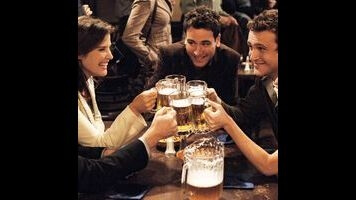How I Met Your Mother: "Jenkins"

Figuring out which long-ago season of a currently-airing show was its pinnacle — it's practically the national sport of TV watchers. We all do it. We fight with each other about it. It fuels our comment sections and gives our TV writers something to blog about on slow weeks. But sometimes I think we systematically devalue what's happening on our screens right now in order to bolster our contentions about some distant golden age.
Take HIMYM as an example. Season 2 has its passionate defenders; others think the show didn't fully hit its stride until seasons 3 or 4. How many of us, though, are willing to go to bat for the present moment? Does saying that the show has never been better make me a chump or a fool?
See, tonight's episode is a good example of why I think we need to appreciate season 5, the one we're right here in the middle of. The show's tricks have ceased to amaze and astound. But that doesn't mean they are any less extraordinary as ways to entertain us and simultaneously reinvent the traditional sitcom form. No, it just means they have become invisible in their virtuosity, and that we've begun to take them for granted. Here is "Jenkins," a typical episode with a Marshall-Lily A-story and a Ted-Robin B-story. It's unlikely to occasion much excitement among passersby because the headiest, showiest stuff — Barney — is kept out of the spotlight. In so many ways, it's just business as usual.
But there's so much elegance and cool design in this streamlined laugh machine. Let's start with a new setting, briefly glimpsed: The college bar. Why introduce it? Because it's the scene of Marshall's dominance, a place where he is the coolest — because of a long-standing skeeball record held under the pseudonym Big Fudge. And the A-story is about Marshall trying to come to grips with the fact that he's not the prize in his marriage. He's the reacher, the one who got something beyond his means; Lily is the settler, the one who took something beneath her level. So he has to prove to Lily (and to himself) that he's not the reacher — he's the Big Fudge.
It's what you do with it once you introduce it that matters, though. "Jenkins" does two things with the college bar. It integrates the whole idea of a college bar with the B-story by having Ted meet his students there. And it has Marshall become attractive to Jenkins, his extroverted prankster and unfortunately attractive new co-worker (played by Amanda Peet), by owning the skeeball game — as Ted puts it, "hitting the 50-hole with nothing but wood." That in itself is unremarkable; it's just what any TV show should once the decision has been made to spend money building or redressing a set. Pure economics.
The proof of the everyday genius of this show at its peak, though, is that the college bar becomes a stage for Ted's insecurities and Robin's ego (or vice-versa). First Ted pretends to be unwilling to fraternize with his students in order to keep his professorial stature. Then when it turns out his students all know Robin — in fact, that they all watch her show — he's once again desperate to be accepted by them. (Witness his awful pun "but-ums up," met with blank stares by his class, and his naked plea to still be allowed to go to the bar and participate in their drinking game.)
The college bar never even gets a name. Lily never sets foot in it. But it is more than a plot device, because this is a show about more than plots that provide an occasion for gags. There's personality here that gets us somewhere even when we go round and round. Robin needs to advance her career. Ted needs to be respected. Lily and Marshall need to work out the dynamics of their relationship; love only gets you so far. As I've said before: Everyone needs to grow up, if not out of childhood per se, out of the stage in which we've defined and settled our identities and into whatever comes next. We're all settlers, but we have to reach even if we're scared to death.
Is that too much to put on twenty-two minutes of laugh-track burdened sitcom that many consider years past its prime? Call me a chump; call me a fool. This isn't anywhere near the best episode of the season, even. But it serves as a perfectly ordinary example of the ambition and detail we've grown so accustomed to. Sometimes it takes a peak experience like "Girls Vs. Suits" last week to remind us to appreciate how well mixed even the well-brand drinks are in this college bar.
Stray observations:
